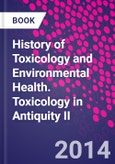This volume, Toxicology in Antiquity II, continues to tell the story of the roots of toxicology in ancient times. Readers learn that before scientific research methods were developed, toxicology thrived as a very practical discipline. Toxicologists are particularly proud of the rich and storied history of their field and there are few resources available that cover the discipline from a historical perspective. People living in ancient civilizations readily learned to distinguish safe from hazardous substances, how to avoid these hazardous substances and how to use them to inflict harm on enemies. Volume II explores the use of poison as weapons in war and assassinations, early instances of air pollution, the use of hallucinogens and entheogens, and the role of the snake in ancient toxicology.
Please Note: This is an On Demand product, delivery may take up to 11 working days after payment has been received.
Table of Contents
1. Murder, Execution and Suicide in Ancient Greece and Rome 2. Chemical and Biological Warfare in Antiquity 3. Anthropogenic Air Pollution in Ancient Times 4. Poisoning in Ancient Rome: Images and Rules 5. Snake as a Symbol of Toxicology in Ancient Greece and Roman Empires 6. Drugs, Suppositories and Cult Worship in Antiquity 7. Kohl Use in Anquity: Effects on the Eye 8. "Gleaming and Deadly White:" Toxic Cosmetics in the Roman World 9. Poisonous Medicine in Ancient China 10. The Venomous Virgin: Fact or Fantasy? 11. Mushroom Intoxication and Religion in Mesoamerica 12. Entheogens in Ancient Times: Wine and the Rituals of Dionysus 13. Entheogens (Psychedelic Drugs) and the Ancient Mystery Religions








